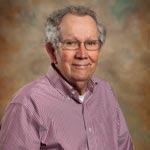David Hogenboom

Degrees
- B.A.. College of Wooster
- M.S., Ph.D.. Pennsylvania State University
Research interests: experimental studies of liquids and plastic solids at high pressures. He has developed a sensitive method to study the change in density when samples melt or freeze at high pressures and to measure the compressibility of the liquid and solid phases. Most recently this method has been applied to the compressibility of ammonia-water and magnesium sulfate-water solutions, which are believed to be major components of the icy moons of the outer planets as well as some asteroids and meteorites. These laboratory data are needed to develop models for the composition and internal structure of these moons and will help explain some of the surface features observed by the Voyager spacecraft — why, for example, large cracks, rifts and other surface features appear on the surfaces of some moons and not others. In the past, David has also studied the viscosity of liquids as a function of temperature and pressures up to 4,000 times atmospheric. He also has used pulsed nuclear magnetic resonance to measure the self-diffusion coefficient of liquids at high pressures.
David’s planetary science research is currently supported by a NASA research grant. Earlier grants from the Research Corporation were helpful in acquiring the high pressure apparatus and associated instrumentation. Student researchers have been involved in all stages of his work and especially with the task of enabling microcomputer control of the instruments. Previous student assistants were coauthors of abstracts of talks at recent Lunar and Planetary Science conferences in Houston. Mark Buyyounouski ’95 was his research assistant in summer 1994, and Yashovardhan Pandey ’97 worked with him during the academic year 1994-95.